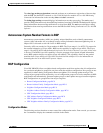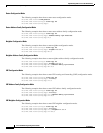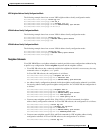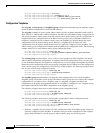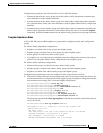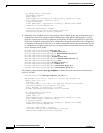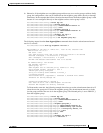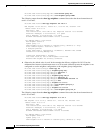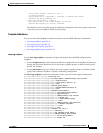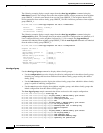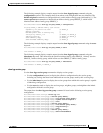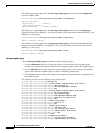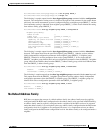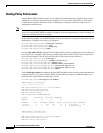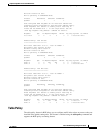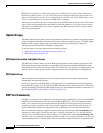
Implementing BGP on Cisco IOS XR Software
Information About Implementing BGP on Cisco IOS XR Software
RC-15
Cisco IOS XR Routing Configuration Guide
OL-14356-01
Route refresh request: received 0, sent 0
0 accepted prefixes
Prefix advertised 0, suppressed 0, withdrawn 0, maximum limit 524288
Threshold for warning message 75%
Connections established 0; dropped 0
Last reset 00:00:25, due to BGP neighbor initialized
External BGP neighbor not directly connected.
The inheritance rules used when groups are inheriting configuration from other groups are the same
as the rules given for neighbors inheriting from groups.
Template Inheritance
You can use the following show commands described to monitor BGP inheritance information:
• show bgp neighbors, page RC-15
• show bgp af-group, page RC-16
• show bgp session-group, page RC-17
• show bgp neighbor-group, page RC-18
show bgp neighbors
Use the show bgp neighbors command to display information about the BGP configuration for
neighbors.
• Use the configuration keyword to display the effective configuration for the neighbor, including any
settings that have been inherited from session groups, neighbor groups, or address family groups
used by this neighbor.
• Use the inheritance keyword to display the session groups, neighbor groups, and address family
groups from which this neighbor is capable of inheriting configuration.
The show bgp neighbors command examples that follow are based on the sample configuration:
RP/0/RP0/CPU0:router(config)# router bgp 142
RP/0/RP0/CPU0:router(config-bgp)# af-group GROUP_3 address-family ipv4 unicast
RP/0/RP0/CPU0:router(config-bgp-afgrp)# next-hop-self
RP/0/RP0/CPU0:router(config-bgp-afgrp)# route-policy POLICY_1 in
RP/0/RP0/CPU0:router(config-bgp-afgrp)# exit
RP/0/RP0/CPU0:router(config-bgp)# session-group GROUP_2
RP/0/RP0/CPU0:router(config-bgp-sngrp)# advertisement-interval 15
RP/0/RP0/CPU0:router(config-bgp-sngrp)# exit
RP/0/RP0/CPU0:router(config-bgp)# neighbor-group GROUP_1
RP/0/RP0/CPU0:router(config-bgp-nbrgrp)# use session-group GROUP_2
RP/0/RP0/CPU0:router(config-bgp-nbrgrp)# ebgp-multihop 3
RP/0/RP0/CPU0:router(config-bgp-nbrgrp)# address-family ipv4 unicast
RP/0/RP0/CPU0:router(config-bgp-nbrgrp-af)# weight 100
RP/0/RP0/CPU0:router(config-bgp-nbrgrp-af)# send-community-ebgp
RP/0/RP0/CPU0:router(config-bgp-nbrgrp-af)# exit
RP/0/RP0/CPU0:router(config-bgp-nbrgrp)# address-family ipv4 multicast
RP/0/RP0/CPU0:router(config-bgp-nbrgrp-af)# default-originate
RP/0/RP0/CPU0:router(config-bgp-nbrgrp-af)# exit
RP/0/RP0/CPU0:router(config-bgp-nbrgrp)# exit
RP/0/RP0/CPU0:router(config-bgp)# neighbor 192.168.0.1
RP/0/RP0/CPU0:router(config-bgp-nbr)# remote-as 2
RP/0/RP0/CPU0:router(config-bgp-nbr)# use neighbor-group GROUP_1
RP/0/RP0/CPU0:router(config-bgp-nbr)# address-family ipv4 unicast
RP/0/RP0/CPU0:router(config-bgp-nbr-af)# use af-group GROUP_3
RP/0/RP0/CPU0:router(config-bgp-nbr-af)# weight 200



